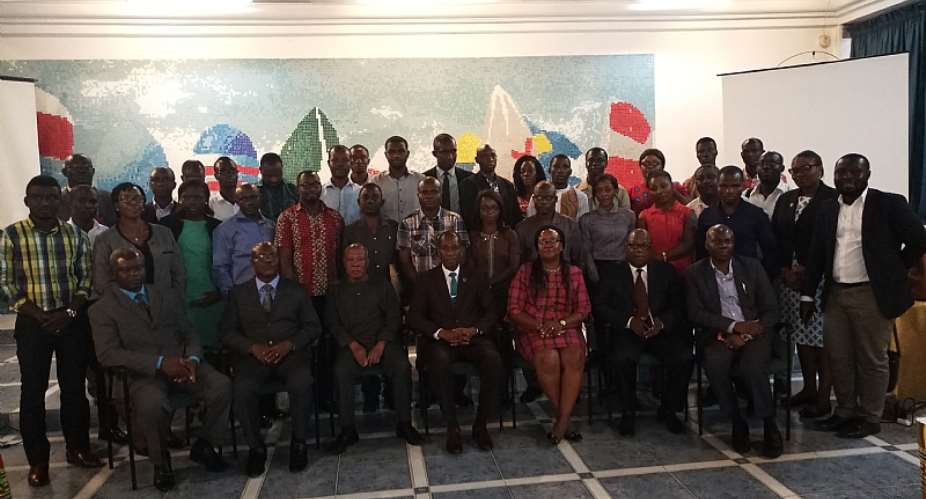The West African Examinations Council (WAEC) has indicated plans to fully roll out modern techniques of curbing examination malpractices using the latest e-Marking software to assess the performance of candidates who sit for their final examination.
The Council which is saddled with high cases of examination malpractices has also adopted strategies to install Closed-Circuit Television (CCTV) cameras at examination centres to check candidates who connive with invigilators to cheat during exams.
Speaking at a seminar to educate the media on Operational Procedures of WAEC in Accra, the Acting Head of Test Administrative Division, WAEC, Ms J. Vanderpuje said the WAEC operational procedures ensures the validity and reliability of test scores butdue to the high incidence of examination malpractices which has bedeviled the Council, test scores and instruments turns up to be unreliable and invalid.
She indicated that out of the 287,353 candidates who sat for the 2017 West African Senior School Certificate Examination (WASSCE), 13,793 candidates were involved in malpractices representing the highest with 4.80percent.
Ms Vanderpuje added that 2006 which marked the end of the SSSCE system, recorded the highest cases in history when the WASSCE system was newly introduced into the country.
According to her, out of the 120,492 candidates who sat for the WASSCE, 9,872 candidates were involved in exams malpractices representing 8.19percent however, due to certain interventions and new approaches undertaken by the Council, the figure reduced to 4,101 cases in 2007 representing 3.16percent.
She indicated that 316,980 candidates have been registered to sit for the 2018 WASSCE adding that 946 schools, 125 depots and 946 supervisors have been registered.
Ms. Vanderpuje cited cases such as leakage of exam papers, impersonation, collusion, seeking assistance from non-candidates, sending prepared notes, programmable calculators, mobile phones and other communication device into the exam hall as trends in examination malpractices.
She said they are faced with the current challenge of rogue websites, mobile related cases, interference by community leaders, registration of unqualified candidates such as form two students for final exams and poor supervision and invigilation.
Ms Vanderpuje intimated that the Council has adopted certain key interventions such as sensitization programs in schools, adverts and radio programs as well as publication of names and schools of offenders in the national dailies to reduce the malpractices.
According to her, the Council has collaborated with the National Security and allied bodies to track down rogues websites as well as review the WAEC law, West African Examinations Council Act 2006 (Act 719) to make punishment for offenders stiffer.
Ms Vanderpuje called for the collective and collaborative effort by all stakeholders to reduce the examination malpractices in the country.
She emphasized that this stakeholder effort is necessary to protect the integrity of our educational systems and credibility of certificates issued by WAEC for use in the sub-region and beyond.
The Head of National Office of The West African Examination Council (WAEC), V. Reverend Sam Nii Nmai Ollennu who refuted the claim that WAEC question are often repeated every year said questions may sound repetitive but different in approach and presentation, and usually varies every year.
On the issue of leakages, he said usually the printing of the exam questions were outsourced to local printers which nicodemously found its way into the public domain however, the Council has put in place measures to block the loopholes.
Rev. Sam indicated that in cases where the Council detects serious cases and decided to cancel the entire examination,it cost them about Gh₵5million to re-administer the questions which is not only expensive but terrible.
According to him, Ghanaians do not seems to border about children cheating in the examination hall to pass their exams but are often worried so much and always seen appealing for sympathy when their wards examination papers or entire results have been cancelled.
On the issue of candidate unable to write their papers due to certain challenges in accessing or locating their exam centres, he said the allocation of examination centres is the sole responsibility of the Ghana Education Service (GES) however, WAEC is responsible for the printing and transportation of question papers.





 Akufo-Addo commissions Phase II of Kaleo solar power plant
Akufo-Addo commissions Phase II of Kaleo solar power plant
 NDC panics over Bawumia’s visit to Pope Francis
NDC panics over Bawumia’s visit to Pope Francis
 EC blasts Mahama over “false” claims on recruitment of Returning Officers
EC blasts Mahama over “false” claims on recruitment of Returning Officers
 Lands Minister gives ultimatum to Future Global Resources to revamp Prestea/Bogo...
Lands Minister gives ultimatum to Future Global Resources to revamp Prestea/Bogo...
 Wa Naa appeals to Akufo-Addo to audit state lands in Wa
Wa Naa appeals to Akufo-Addo to audit state lands in Wa
 Prof Opoku-Agyemang misunderstood Bawumia’s ‘driver mate’ analogy – Miracles Abo...
Prof Opoku-Agyemang misunderstood Bawumia’s ‘driver mate’ analogy – Miracles Abo...
 EU confident Ghana will not sign Anti-LGBTQI Bill
EU confident Ghana will not sign Anti-LGBTQI Bill
 Suspend implementation of Planting for Food and Jobs for 2024 - Stakeholders
Suspend implementation of Planting for Food and Jobs for 2024 - Stakeholders
 Tema West Municipal Assembly gets Ghana's First Female Aircraft Marshaller as ne...
Tema West Municipal Assembly gets Ghana's First Female Aircraft Marshaller as ne...
 Dumsor is affecting us double, release timetable – Disability Federation to ECG
Dumsor is affecting us double, release timetable – Disability Federation to ECG
